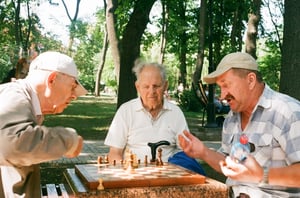As we age, there are added benefits of staying busy. Remaining active and engaged during the day...
4 Strategies to Combat the Risks of Loneliness
As we age, it's important to focus on building and maintaining strong social connections to promote a positive and fulfilling life. Loneliness is a common experience for many older adults, but it doesn't have to be a permanent part of their lives.
In this blog post, we will discuss the importance of social connections for older adults and provide strategies for building and maintaining relationships. Whether you are a senior looking to combat feelings of loneliness or a caregiver looking to support the social well-being of an older loved one, this blog post is for you. We hope that these strategies can lead to more positive and fulfilling lives full of meaningful social connections.
Mental Health Risks of Loneliness
The effect that loneliness has on the mental health of individuals is profound. It increases depression, can lower memory and processing, and can slow the rate of learning new tasks or ideas. These can add to the increased feelings of failure and depression, and each is likely to worsen as depression worsens.
People are social by nature and built, requiring social interactions with loved ones and friends in order to maintain their mental and physical health. As social interactions decrease or the quality of those interactions becomes less positive and enjoyable, there is an increase in feelings of loneliness and isolation. This sense of isolation is detrimental to many of the processes of the brain, including memory.
Memory
 Decreased memory affects many areas of life. The loss of memory often affects the ability to recognize family and friends and complete daily tasks such as getting dressed and eating well. It can be difficult to remain active in hobbies and pastimes. Reading becomes quite challenging when the memory fades, and even watching television shows can lose meaning. Memory loss is also a strong indication that a caregiver or senior living situation is required.
Decreased memory affects many areas of life. The loss of memory often affects the ability to recognize family and friends and complete daily tasks such as getting dressed and eating well. It can be difficult to remain active in hobbies and pastimes. Reading becomes quite challenging when the memory fades, and even watching television shows can lose meaning. Memory loss is also a strong indication that a caregiver or senior living situation is required.
Learning
Throughout life, we are constantly learning new tasks, meeting new people, learning about them, and discovering new hobbies. The learning process never ends, and we are continually evolving and growing through new information and experiences. When the ability to learn is stunted by loneliness and isolation, there is less joy in new experiences. It can be challenging to learn the names of new people or to discover a new hobby that better matches your abilities and interests, and many other opportunities can be lost.
Depression
 Depression often follows the development of loneliness. Depression can become debilitating. It affects all areas of life, including the increased risk of disease and the inability to get a proper night of sleep. Depression can make it harder to fall asleep and stay asleep, lowering the ability of the body to function well. When the body does not have the correct amount of sleep, it will lack energy the next day and become more prone to injury and falling.
Depression often follows the development of loneliness. Depression can become debilitating. It affects all areas of life, including the increased risk of disease and the inability to get a proper night of sleep. Depression can make it harder to fall asleep and stay asleep, lowering the ability of the body to function well. When the body does not have the correct amount of sleep, it will lack energy the next day and become more prone to injury and falling.
Depression also increases the likelihood of suicidal thoughts and actions while decreasing the energy within the body. Those suffering from depression also tend to see an increase in illnesses as the immune system is less active and produces less of the responses required to maintain a healthy body.
Along with the other effects of depression, a decrease in motivation can lower the person's activity levels. Lack of motivation can affect the entire life and increase depression as tasks remain incomplete.
Could your loved one be experiencing depression? Click here to learn about how to identify the signs of depression.
Physical Effects of Loneliness
The physical effects of loneliness on the body include an increase in pain and illness such as arthritis and muscle soreness, as well as decreased balance and focus. These can cause injuries more frequently and allow for worse damage to the joints and the bones. It reduces bone strength and affects the repair of the bones when they become damaged.
There is also an increase in blood pressure and stress hormones in those who suffer from loneliness and isolation. These increases cause the same health effects that high blood pressure and stress do in any other circumstance, including headaches, eyesight concerns, and even the risk of stroke or heart attack in some situations.
4 Ways to Combat Loneliness
Everyone should remain active in their community and maintain social interactions, but this may be even more important for older adults and retirees. The following are some ideas for combating loneliness, remaining interactive with others, and maintaining social interactions for physical and mental health.
1. Try New Things
 As people age, some activities become no longer feasible, and lifestyle has to change to adapt to new limitations. These may include driving, sports, walking longer distances, and some hobbies. To combat loneliness and its effects, there is a need to try new things and expand to new activities. A senior center is a great place to access the things needed to try new hobbies, new books or games, and meet new people with similar limitations. Having access to a new group of people who may have similar interests can increase social interactions and have a positive effect.
As people age, some activities become no longer feasible, and lifestyle has to change to adapt to new limitations. These may include driving, sports, walking longer distances, and some hobbies. To combat loneliness and its effects, there is a need to try new things and expand to new activities. A senior center is a great place to access the things needed to try new hobbies, new books or games, and meet new people with similar limitations. Having access to a new group of people who may have similar interests can increase social interactions and have a positive effect.
2. Try Something Creative
Remaining creative as a person ages can boost positive feelings and interactions, slowing the effects of both aging and loneliness. It allows for the use of the whole brain and an improved ability to learn new things. Writing, painting, drawing, and other crafts and hobbies can help maintain health as people age.
3. Get a Pet
 Having a pet that is easy to care for but can interact with a person can create a sense of social interaction and help people feel less lonely. Studies have shown this can extend the lifespan and increase the happiness of older adults, allowing them to feel important and needed.
Having a pet that is easy to care for but can interact with a person can create a sense of social interaction and help people feel less lonely. Studies have shown this can extend the lifespan and increase the happiness of older adults, allowing them to feel important and needed.
Is adopting a pet in retirement right for you? Click here to find out!
4. Volunteer
There are many ways that a senior can volunteer in the community. This helps them to remain active and provides feelings of being valued, as well as combat feelings of loneliness by increasing social interactions and helping to create friendships. Reading with young children, working with pets, and other activities can help maintain both mental and physical health, counteracting the effects of loneliness.
Let us know in the comments below - how do you prevent feeling lonely?
Related Content:






